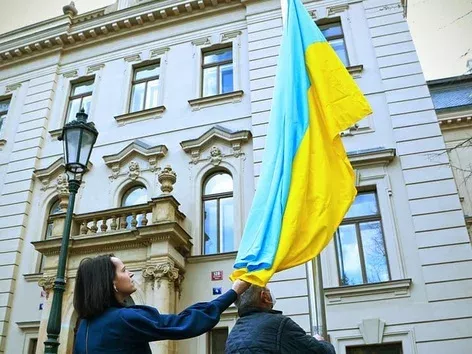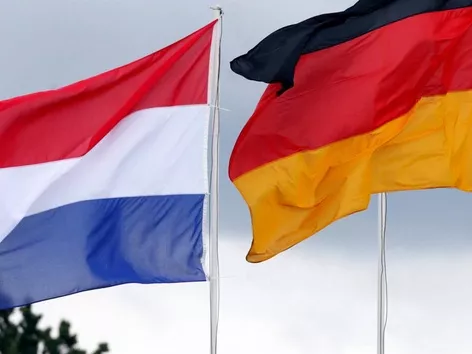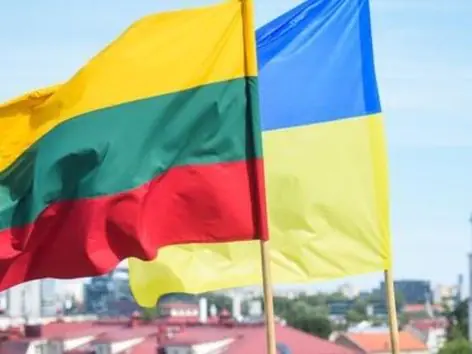Ukrainians contribute more to the European budget than some countries spend on their support: details in figures

Millions of Ukrainians have been forced to move to European countries since the start of the full-scale invasion. Find out more about how refugees have helped the EU economy and what it costs Ukraine
The wave of migration caused by russia's full-scale invasion has become the largest since World War II. The increase in the number of vulnerable citizens in EU countries has put an additional strain on the economy, which had already been weakened by the impact of the COVID-19 pandemic.
According to the IMF, the European Union has spent €30-37 billion to support refugees from Ukraine. Although this figure is extremely high, it is only about 0.2% of the EU's GDP.
At the same time, it cannot be said that Ukrainians have weakened the economy. According to the National Bank of Ukraine, in 2023, Ukrainians will spend up to $2 billion per month abroad.
How exactly do Ukrainians support the EU economy?
Ukrainians who have found refuge in the EU support the country due to the following factors:
1. Spending on purchases. russian aggression has caused inflation, which has worsened the purchasing power of EU citizens. Under these conditions, the contribution of Ukrainians has become tangible;
2. Legal employment and payment of taxes. The right to work for Ukrainians has been legalised through the status of temporary protection. Consequently, refugees have become full-fledged players in the labour market, paying taxes on the same terms as everyone else;
3. Use of bank cards and transactions with ATMs. In March 2022 alone, about $10 billion was withdrawn abroad;
4. Rental housing. A quarter of refugees can pay for housing. This factor both strengthens the economy and drives up property prices.
In which countries is the contribution of Ukrainians the largest?
Poland and Germany have become leaders among countries in terms of the number of non-cash payments. In Poland, this figure is 28% of the total, and in Germany - 10%.
There are about 400,000 refugees from Ukraine in the Czech Republic. Almost 90% of those able to work are already employed, and in the first quarter of 2024, budget revenues from them exceeded expenditures by almost two times.
Here are the details in numbers:
According to novinky.cz, the receipts of taxes and other contributions of Ukrainian refugees to the Czech budget almost doubled the expenditures on them. In the first half of the year, revenues totalled 11.7 billion CZK (about 465 million euros), the Czech Ministry of Labour and Social Affairs reported.
‘It is important that refugees from Ukraine have long contributed to our budget much more than we spend on helping their compatriots. They are a benefit to us, not a burden,’ said Minister Marian Jurečka.
In the first quarter of 2024, expenditures on refugees amounted to 3.8 billion kroons, while revenues totalled 5.8 billion kroons. In the second quarter, expenditures decreased to 3.5 billion kroons, while revenues increased to 5.9 billion kroons. Thus, Ukrainian refugees brought the Czech state budget 4.4 billion CZK (approximately EUR 175 million) over the six months.
According to lsm.lv, the Organisation for Economic Co-operation and Development (OECD) estimates the additional contribution of Ukrainian refugees to the annual GDP growth rate of the Czech Republic, Poland and Estonia at 1.2% per year, and to the GDP of Hungary, Latvia, Slovakia, Lithuania and Romania at almost 0.8%. Even in the UK, it hovers around 0.2%. This is billions of euros a year.
The publication notes that by paying taxes, Ukrainians have become part of the European workforce and are already supporting the economies of the countries where they live. For example,
Visit Ukraine on social media: Telegram | YouTube | Instagram | Facebook | Twitter | TikTok
Surge in the labour market
Ukrainians have become a source of labour in the EU by actively integrating into the labour market. It would not be surprising to say that Ukrainians in Poland are the most active - according to international estimates, half of refugees are officially employed.
The Centre for Migration Studies at the University of Warsaw reported that employed refugees paid about $2.4 billion (PLN 10 billion) in taxes. This amount alone is higher than the financial assistance provided to Ukraine (excluding the costs of education and healthcare).
The contribution of migrants is also felt in other countries. The Organisation for Economic Co-operation and Development (OECD) notes that refugees contribute to annual GDP growth by:
- 1.2% in Poland, the Czech Republic and Estonia;
- 0.8% in Hungary, Latvia, Slovakia, Lithuania and Romania.
Oxford Economics experts have made other forecasts, primarily for Poland. If 650,000 migrants remain in the country after the war, GDP will increase by 1.2%, and if 1 million migrants remain, the additional growth will be 2%.
Negative trends affect Ukrainians themselves. Although 66% of refugees have a university degree, most work in low-wage industries.
By the way, the financial situation of refugees in Europe has become worse compared to life in Ukraine before the war. Previously, 12% had an income that was only enough for food, and now this figure has risen to 42%.
What is the outlook for Ukraine?
People are the most important value and resource for every country. And the war has once again confirmed this. Therefore, every refugee who does not return to Ukraine will contribute to the deterioration of the already difficult economic and demographic situation.
The Ministry of Economy expects that about three quarters of temporary migrants will return home in the first years after the end of hostilities. The biggest concerns relate to students who have easily entered European universities and educated women who have found jobs and adapted to life abroad.
According to Oleksiy Sobolev, Deputy Minister of Economy, 100,000 people who do not return to Ukraine will reduce GDP by 0.5%. The demographic situation will also be affected, as in 2023 there will be 0.8 children per woman. If some women do not return after the war, the situation will be even worse.
The Ukrainian authorities are currently working on mechanisms to encourage refugees to return home after the war.
We remind you! Ukrainians have opened every tenth business in Poland since the beginning of this year. In general, the number of Ukrainian entrepreneurs in this country has increased many times since the war started. What kind of business is more often opened by Ukrainian citizens in Poland and where to look for help to open businesses abroad, read here.
Want to know more? Read the latest news and useful materials about Ukraine and the world in the News section.
Ihor Usyk is the Head of Legal Department at Visit Ukraine
Business relocation is a complex process that requires a clear plan and an understanding of the legislative nuances of different countries. Entrust this matter to Visit Ukraine professionals and be sure that your business and finances are in good hands!
Our recommendation for a safe and comfortable trip:
Visit Ukraine Insurance - insurance for a safe stay abroad without unnecessary expenses;
Green Card - compulsory car insurance for traveling abroad;
Visit Ukraine Tickets - book tickets for buses, trains, and airplanes to/from Ukraine and between cities around the world;
Private Lawyer service - professional legal support on visa and migration issues;
Visit Ukraine Merch - buy patriotic clothing and accessories with worldwide delivery.
© 2018-2024, Visit Ukraine. Use, copying or reprinting of materials on this site is permitted only with a link (hyperlink for online publications) to Visit Ukraine.
All rights reserved.
Häufig
gestellte Fragen
How many refugees are there from Ukraine in the EU?
What will happen to refugees after the end of the war in Ukraine?
What will happen to the population of Ukraine?
Recommended articles
1 min
Für Flüchtlinge
Czech authorities have introduced a new type of residence permit for refugees from Ukraine. This type of residence permit is intended for those who wish to stay in the Czech Republic for a longer period. Learn more about the conditions and benefits of this status
07 Aug. 2024
More details2 min
Popular
Bürger der Ukraine in Deutschland und den Niederlanden: Ergebnisse einer soziologischen Umfrage
Seit dem Beginn der groß angelegten Invasion haben die EU-Länder mehr als 4 Millionen ukrainische Flüchtlinge aufgenommen. Deutschland und die Niederlande gehören zu den Ländern, die mehr als einem Drittel von ihnen Schutz gewährt haben. Eine der jüngsten soziologischen Studien befasst sich mit den Erfahrungen von Ukrainern als Arbeitsmigranten und Binnenvertriebene. Lesen Sie mehr in diesem Artikel.
10 Aug. 2024
More details2 min
Arbeit
Derzeit haben ukrainische Ärzte, die infolge der Feindseligkeiten nach Deutschland gezogen sind, einige Schwierigkeiten, eine Zulassung zu erhalten, was sich sowohl für sie als auch für den Dienstleistungssektor im Lande negativ auswirkt. Das Hindernis ist die deutsche Bürokratie, die jedoch überwunden werden kann, wenn man einem klaren, gesetzlich vorgeschriebenen Algorithmus folgt.
10 Aug. 2024
More details1 min
Arbeit
New labour conditions for Ukrainians in Lithuania: you need to obtain a residence permit
From 1 September, employment conditions for Ukrainians in Lithuania will change. Persons without temporary protection status must obtain a residence permit. Find out about changes in working conditions for Ukrainian refugees
09 Aug. 2024
More details

